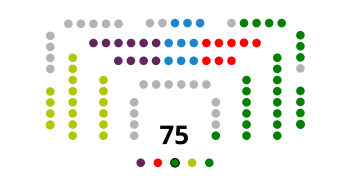Parliament of the Autonomous Community of the Basque Country
| logo | Parliament building |
|---|---|

|

|
| Basic data | |
| Seat: | Vitoria, Spain |
| Legislative period : | 4 years |
| MPs: | 75 |
| Current legislative period | |
| Last choice: | September 2016 |
| Next choice: | September 2020 |

|
|
| Distribution of seats: |
Government (37)
|
| Website | |
| www.legebiltzarra.eus | |
The Basque Parliament ( Basque Eusko Legebiltzarra , Spanish Parlamento Vasco ) is the legislative body of the Basque Autonomous Community of Spain and the elected assembly to which the Basque government is subordinate.
history
Parliament sits in the Basque capital, Vitoria-Gasteiz , although the first session of the modern assembly, as established by the Statute of Autonomy of the Basque Country, took place on March 31, 1980 in Guernica - the symbolic center of Basque freedoms. Later, in 1980, they began to meet on the premises of the Alavian government. In 1982 it was given its own location in a former high school. The symbol of Parliament is an oak sculpture by Nestor Basterretxea depicting a stylized tree, a nod to the tradition of Basque political assemblies that meet under a tree, as in Guernica.
composition
It is composed of seventy-five MPs who represent citizens from the three provinces of the Basque Autonomous Community. Each province ( Álava , Gipuzkoa and Biscay ) elects the same number of MPs, despite having very different populations. This was chosen to get support from Álava and Navarre, the less populated areas where Basque nationalism is less popular. Nevertheless, Navarre did not join the Autonomous Community.
Electoral system
The elections are conducted on a proportional representation system with a closed list, with seats being allocated on a provincial basis using the D'Hondt procedure . To qualify for a seat in a particular province, the electoral roll must receive at least 3% of the votes cast in that province. From 1984 to 2001, the voting threshold in each province was 5%. The Basque Parliament meetings are held in both Basque and Spanish, with translation services. The current President of the Basque Parliament is Bakartxo Tejeria, who was elected in 2012.
Web links
- Basque Parliament website (Basque, Spanish)
